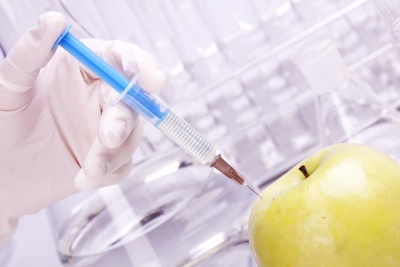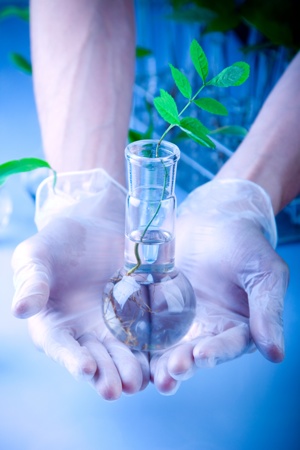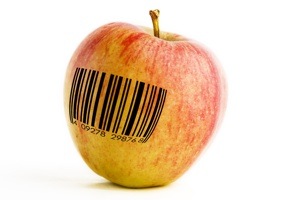
Back in the 90’s seed company Pioneer Hi-Bred added a gene from Brazil nuts to soybeans in order to make the soy more nutritious. Studies showed, however, that consumption of the “improved” soy could trigger anaphylaxis and other allergic responses in humans with a Brazil nut allergy. The project was scrapped.
In 1997, The Scottish Crop Research Institute published research showing that the lives of ladybugs were cut in half and they laid fewer eggs when they fed on aphids that had eaten genetically modified potatoes. This raises concerns about a genetically modified food supply, given the affected animals hadn’t fed on the GM potatoes themselves, but rather they’d eaten something else that had.
These two case studies showcase some of the concerns about genetic modification of crops, something that is occurring in the United States at an alarming rate.
Genetic Modification

Labeling of genetically modified foods is not currently required by law in the United States unless they contain elements of a highly allergenic food (such as peanut protein), so you are unlikely to know whether the foods you purchase are genetically modified or contain genetically modified ingredients. According to the University of Florida, as much as 60 to 70 percent of consumable products in American food stores contain genetically modified ingredients. Shocking!
Monsanto Seed Controversy

Along with superweeds, Roundup also has been linked to a worldwide decimation of frogs, which naturally control pests without chemicals. Recent research also shows that Roundup herbicide induces tadpoles to change shape. Claims of increased yields from Monsanto’s Roundup Ready seeds also seem to be overblown. In fact, the Soil Association notes that yields from GM crops are lower than, or at best equivalent to, non-GM crops.
For centuries, farmers have harvested their crops, keeping seeds for next year’s planting as part of the harvest. Companies like Monsanto, however, have been slowly buying up the world’s supply of seeds for crops like corn, potatoes, and soybeans. With a growing monopoly on the supply of staple crop seeds, Monsanto is patenting the seeds and suing farmers for piracy if they save them from their harvest to replant the following year. This requires farmers to purchase seeds every year, a practice that raises the price to farm such crops. These types of practices are slowly squeezing out the small farmer, who just can’t afford to keep up with the huge industrial farming operations. It’s beyond evil.
Potential Health Dangers

- Chinese scientists recently found small pieces of rice RNA in the blood and organs of humans who consumed genetically modified rice.
- A 2003 study showed that GM soy altered digestive enzymes in mice.
- Multiple animal studies have linked GMOs to reproductive problems and infant mortality.
Avoiding GM Foods

- Avoid processed foods that come in cans, bags, boxes and packages because they contain many of the staple crops that are often genetically modified.
- Purchase your produce from local farmers that use organic farming practices and heirloom seeds. You can find local farmers at farmers’ markets and produce stands.
- Choose organic grains from crops less likely to be GM, such as quinoa and millet.
- Eat mostly plant foods, because it is virtually impossible to know what ranchers feed their livestock unless you know the ranchers and can question them.
- Consider growing your own produce, and think of foods for energy, the stuff that comes from the ground – grown in pots, hydroponic farms, and in anything you can imagine.
The more people that aware of this very scary issue that affects all of us (like disposable diapers!), the more we can stand up to it. Please pass this along and help spread the word!!


I like the idea of growing my own produce. But how do I know if the seeds I purchase are not genetically modified?
The best way i to find seeds marked as heirloom. These seeds have not been modified and are from strains that can also reproduce from the fruit they make. Many seeds you buy in stores, although not genetically modified, per se, are hybrids that will create fruits with seeds that will not reproduce or that will produce a fruit unlike the one you originally grew.
scrary indeed,in Germany they just permit ,but it is limited growing GM Foods.
People in Germany and other Countries in Europe are strict against it.
All Food and that is different than in the US must be labeled and after a recent visit to my Home Country I found out that GM Food is not selling very well.
I wish the US would label all their Food so that Consumer know what their buying.
Thank you for such informative article!!! I hope the GMO labeling issue gets more well-known to the public :)
Thank YOU for all this information! I have always felt that GMOs are an example of something that should never be carried out. It is sad that labeling doesnt even require GM products to be identified! It is the same here in Australia.
Due to this, whenever I buy products from the supermarket (nut butters, grains) I always Try to look for organic! GM bananas also exist in Aus, which is heartbreaking. Now consumers don’t just have to look out for wheat, canola, soy, we are worried about bananas too! :(
Hi Kim, great article! I often wonder about organic produce I buy. Sometimes lemons labelled as organic, don’t have seeds. ?? Any tampering you know of?
Also, I’ve been thinking of scheduling a consultation with you. How would I go about doing that?
I’ve started growing a lot of my own veggies recently. Should I be worried about the kind of seeds or plants I buy? I always try to buy organic everything, but I have one heirloom tomato plant that my boyfriend bought that was not organic. Should I ditch that tomato plant?
Very interesting article. It’s really scary how much goes on behind the backs of the American public. More people should be outraged that what we eat is controlled by drug companies and big business. As a mother of a son with food allergies, I can’t help but wonder if sudden increase in allergies isn’t somehow, if not directly, related to GM foods.
Wonder if the exectives, employees, shareholders, etc, Monsanto consume food containing their own products?
I love this question.
Great question!
Knowing some of them, I can attest to the fact that they, indeed, do eat their products.
Timely post, I just finished watching “Food, Inc.” and “The Future of Food”. Scary things happening to our food supply with the big businesses controlling the government groups that are supposed to be protecting us. Where is the pubic outcry? Why are the courts supporting these industry giants when the people are overwhelmingly against what they are doing? What happened to democracy? It appears to me that the problem lies with the patent laws…these mega companies own the genetic patents and are bullying the little farmers out of business when their “patented” franken-seeds take on a life of their own. It’s a crime, and these big agro companies should be made to clean up their mess. I am afraid though, that the genie is out of the test tube, and there may be no controlling it.
Watch “Food Inc.” and “The Future of Food”, tell everyone you know to watch them, it’s time for people to know where their food comes from, and who is really at the top of this food chain.
I used to think that GM foods were just a product of selective breeding for desirable traits (which is what farmers and breeders have been doing for centuries), but now know that scientists really are messing with nature by using bacteria and viruses to cross breed between species that nature would never allow. We should be afraid because we are the target of this big lab experiment, and without the proper labelling we don’t even know it!
Personally, I have stopped buying packaged foods because I don’t really know what is in them. We need stricter labelling laws. I try to choose organic and local as much as possible. As consumers, we ultimately have all the power, if we can get enough people to stand together and put our money where our mouth is.
Thanks Kimberly, for adding your voice to this issue. I’d like to see more celebrities speaking out about this, their voices carry far.
Hi Kim :-)
Can you post the recipe to your Spring Beauty Smoothie?
Thanks!
Where do we start? At a minimum we need to get these GMO’s labeled…..full disclosure should be a right….
Kim,
I read your book when it first came out and I pass it on to everyone. Can you please tell me if you still juice daily along with your GGS? I’m just wondering if I need to have fresh vegetable juice everyday still.
Thank you
Hi Kim!
I saw yesterday that my toothpaste is gluten free… Other toothpastes have Gluten!?
xx
L
Hi Kim!
Thanks so much for the info! I am trying to eat better and follow your plan, I am finding myself eating healthy during the day, but feeling really unfulfilled after my meals, I always end up resorting to sweet and chocolates. (So bad, I know!!) But it’s like I can’t help it! I know I should be drinking Acai smoothies or something, it’s just so hard! Any suggestions? It’s getting out of hand, all the hard work I do during the day gets tossed when I start eating all that sugar stuff. :(
Thank you!!!
Amanda
Hi Kim, I understand that you have some connections and I see your blog as speaking the truth and I wonder will you report on the goal of Monsanto and bill gates in their quest to depopulate the world by 2050… ..they want population reduction and they are slow killing us all.. all the chemicals we are bombarded with daily..is this just for money or is it something more sinister occuring …I have one piece of advice..get the heck out of America and Europe and the western world. We are being assaulted with a biological and chemical warfare as I speak…I am planning on leaving for the middle east
Thank you for this article. I passed it on to my Mom in hopes that she finally understands what I am trying to tell her about GMO.
My understanding is you are safe if you are buying organic. Organic food is more strictly regulated and cannot contain GMOs.
According to Vladimir Megre’s fifth book, eating mutant foods literally turn you into a mutant. Besides all else, it says they dull human intellect and feelings!!
Hi Kim,
It would be great if I could link your articles to my Facebook.
人気通販店